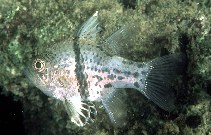| Family: |
Apogonidae (Cardinalfishes), subfamily: Apogoninae |
| Max. size: |
10 cm TL (male/unsexed) |
| Environment: |
reef-associated; marine; depth range 0 - 5 m |
| Distribution: |
Indo-Pacific: East Africa to Kiribati, north to the Ryukyu Islands, south to New Caledonia; Belau to eastern Caroline and Mariana Islands in Micronesia. |
| Diagnosis: |
Dorsal spines (total): 8-8; Dorsal soft rays (total): 9-9; Anal spines: 2-2; Anal soft rays: 9-9. Greenish grey, with dark vertical bar from origin of spiny dorsal to just in front of anus; scattered spots on body, head and 1st dorsal membrane; pelvic fins dark (Ref. 4329, 48635).
Description: Juvenile with more vivid dark markings; greatest depth of body 1.8-2.0 in SL (Ref. 90102). |
| Biology: |
Restricted to coastal waters, forming small aggregations among mangroves, rocks, debris, or piers of shallow sheltered shorelines. Feeds at night (early evening and just before day break), primarily on planktonic crustaceans. Courtship and spawning occur fortnightly (shortly before new moons and full moons). Eggs are incubated by the male for about 8 days. Larval phase pelagic. Sexual maturity is attained at 7 cm by males and at 6 cm by females (Ref. 1602). |
| IUCN Red List Status: |
Least Concern (LC); Date assessed: 05 February 2021 Ref. (130435)
|
| Threat to humans: |
harmless |
Source and more info: www.fishbase.org. For personal, classroom, and other internal use only. Not for publication.

